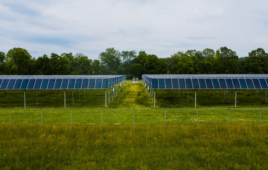Intriguing and enigmatic, a new dawn emerges in Wisconsin as Republican lawmakers embark on an ambitious journey to enact legislation that will empower communities through solar energy. With abstract lexicon vocabulary and an ambivalent tone, this article delves into the uncharted territory of community solar-enabling legislation.
A Glimmer of Hope Amidst Uncertainty
Wisconsin’s political landscape is often characterized by its conservative leanings, making this unexpected move towards community solar all the more captivating. As whispers of change reverberate through the halls of power, one cannot help but feel both anticipation and skepticism about what lies ahead.
The proposed legislation seeks to harness the untapped potential of renewable energy sources within local communities. By enabling shared access to solar power generation facilities, it aims to foster a sense of collective responsibility towards sustainable practices while also promoting economic growth.
However, amidst this glimmering hope for progress lies a clouded horizon. The ambivalence surrounding these efforts stems from concerns over how such initiatives may be received by traditionalist factions within the party. Will they embrace this paradigm shift or resist it with fervor?
Navigating Uncharted Waters
As Wisconsin Republicans navigate these uncharted waters, their intentions remain shrouded in ambiguity. While some see community solar as an opportunity for bipartisan collaboration and environmental stewardship, others view it as a potential threat to established interests.
The proposed legislation acknowledges that embracing renewable energy is not just an environmental imperative but also an economic one. It recognizes that empowering local communities with clean energy alternatives can create jobs and stimulate economic growth in regions where opportunities have been scarce.
This legislative endeavor raises questions about whether Republicans are truly committed to embracing a more sustainable future or if they are merely attempting to appease an increasingly environmentally conscious electorate. The answers lie in the intricate dance between political expediency and genuine conviction.
Building Bridges for a Greener Tomorrow
Amidst this ambivalence, one thing remains clear: community solar-enabling legislation has the potential to bridge ideological divides and foster collaboration across party lines. By emphasizing the economic benefits of renewable energy, Republicans hope to find common ground with their Democratic counterparts.
The proposed legislation also recognizes that empowering local communities through solar energy can lead to increased self-sufficiency and resilience in the face of climate change. It acknowledges that sustainability is not just an abstract concept but a tangible solution that can improve lives and protect our planet for future generations.
In conclusion, Wisconsin Republicans’ pursuit of community solar-enabling legislation represents both a departure from convention and an opportunity for transformative change. As abstract as their intentions may seem, it is crucial to approach this development with cautious optimism. Only time will reveal whether these efforts will bear fruit or fade into obscurity, leaving us pondering what could have been.

